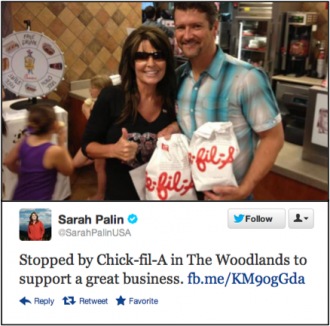
Have you been following all of the news about Southern fast-food giant Chick-fil-A lately? First, there was the company’s leader coming out against Barack Obama’s support of same-sex marriage; then, last week, Mike Huckabee (former Arkansas governor and current Fox News host) called for a national Chick-fil-A appreciation day (which apparently led to an unprecedented day of sales and profits, including a particularly high-profile meal purchased by former Alaska governor Sarah Palin). Last weekend in the New York Times, UCLA sociologist Edward Walker wrote a provocative op-ed to put all this into historical and sociological context.
The alliance between business corporations and moral leaders isn’t brand new. Indeed, Walker begins by harkening back to the unholy alliances between Baptists and bootleggers in the days of Prohibition. However, the relationships do seem to be becoming more typical and pronounced. Examples range from Harrah’s (the casino chain) organizing their vendors and employees into a coalition to promote for-profit colleges with Students for Academic Choice, described by Walker as “a seemingly grass-roots organization led by students promoting the benefits of ‘postsecondary career-oriented institutions.'”
As Walker explains:
Today, business interests are involved in many efforts to partner with citizen advocacy groups as a corporate tool beyond conventional lobbying. They hire consultants to help them to organize. I estimate, based on my studies of “grass-roots lobbying firms” since the early 1970s, that this subspecialty of corporate lobbying is now a $1 billion-a-year industry.
One billion dollars. That’s not chump change. Walker goes on to suggest that 40 percent of Fortune 500 companies use “grass-roots-mobilization consultants,” some of which are “independent agencies founded by former political campaign professionals,” others being branches of huge public relations firms. He notes, “Businesses hire these consultants most often when facing protest or controversy, and highly regulated industries appear to be some of the heaviest users of their services.”
This is not just about politics or public relations. “As business has become more politically mobilized and as the field of citizen advocacy organizations has expanded since the 1970s,” Walker explains, “corporations and industry groups have become much more active in financing pro-corporate activists.”
In a time when companies are particularly sensitive to protest groups, threats of boycott and accusations of corporate irresponsibility, corporations need grass-roots support, or at the least the appearance of it, to defend their reputations and ability to make profits.
If Walker highlights the economic side of these corporate practices in this piece, however, there is clearly a huge political aspect as well. In fact, in this election season what may be most interesting and consequential is precisely how politics and economics merge, the lines between them blurring and disappearing. Indeed, in talking with other researchers and practitioners about these developments, I heard a lot about the relationship between buying habits and political views. Apparently, they are so highly correlated that political operatives are now using consumer characteristics strategically to target campaigns and tap potential voters. They do so, it is worth noting, using tools data and methods from the scholarly social sciences—standard Census demographic data and GIS packages—but what they have that academic analysts do not have access to is the market data supplied by private, for-profit firms.
There’s obviously a lot more to be said about all this. For more about Walker’s views, especially those on “Industry-Driven Activism,” listen to the podcast that our great TSP team did with him in July 2010.

Comments